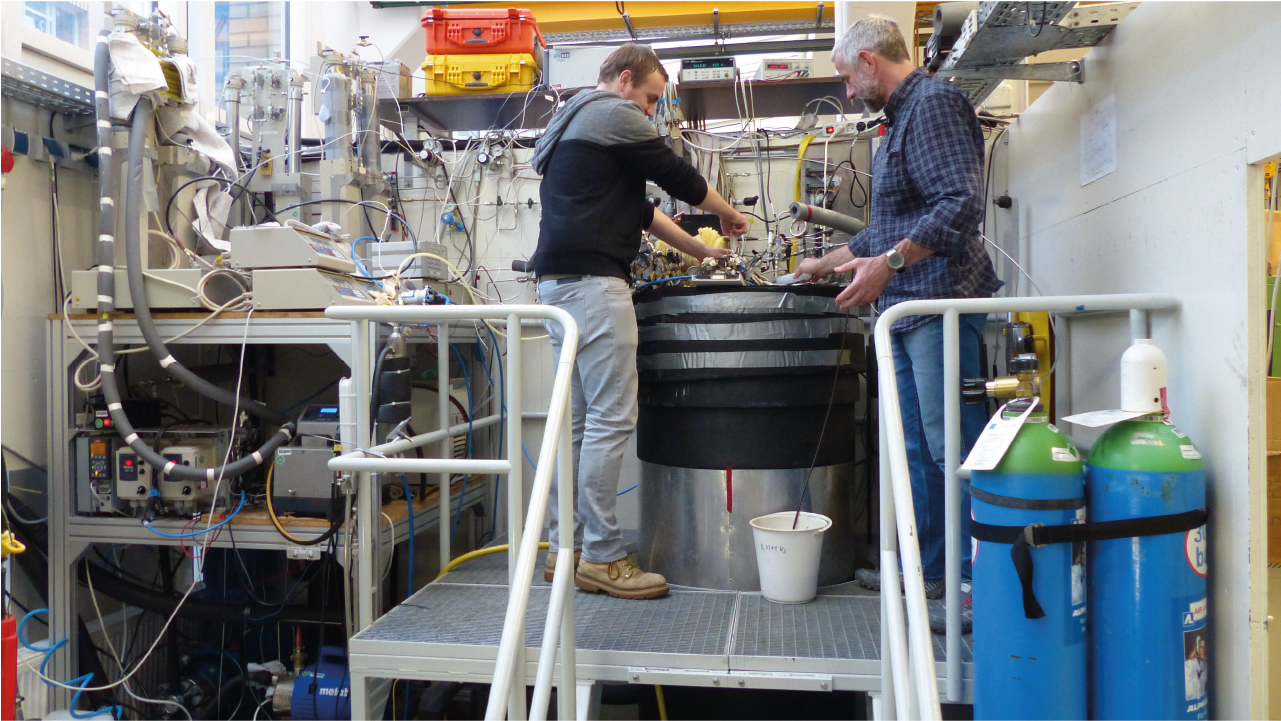Experimental Simulation of Reservoir Processes (LARS)
Contact:
Web:
Infrastructure belongs to:
LARS is large volume experimental apparatus for the investigation of anthropogenic induces and natural occurring reservoir processes under simulated in situ conditions in the lab. The sediment sample has a diameter of 0.45m and a length of 1.35m. This large sample allows the installation of „model wells“ for the injection and production of pore fluids as well as the installation of different sensors to monitor various physical parameters during an experiment
The apparatus was set up together with section 3.1 with in the first funding phase of the SUGAR project. This project aims to study innovative methods for the production of methane from methane hydrate. (Schicks, J. M., Spangenberg, E., Giese, R., Steinhauer, B., Klump, J., & Luzi, M. (2011). New approaches for the production of hydrocarbons from hydrate bearing sediments. Energies, 4(1), 151-172.)
A prerequisite for these tests was the production of sufficient amounts of methane hydrate in the pore space of the sediment sample from methane dissolved in water. This hydrate formation mechanism is assumed to be responsible for the observed high hydrate accumulations in sandy reservoirs. (Spangenberg, E., Priegnitz, M., Heeschen, K., & Schicks, J. M. (2014). Are Laboratory-Formed Hydrate-Bearing Systems Analogous to Those in Nature?. Journal of Chemical & Engineering Data, 60(2), 258-268.)
For the process monitoring of hydrate formation and hydrate decomposition during production an electrical resistivity tomography (ERT) with 375 electrodes was installed within the second funding phase of the SUGAR project. The ERT allows to distinguish between the conducting pore water and the electrically insulating methane hydrate/methane gas in the pore space. (Priegnitz, M., Thaler, J., Spangenberg, E., Rücker, C., & Schicks, J. M. (2013). A cylindrical electrical resistivity tomography array for three-dimensional monitoring of hydrate formation and dissociation. Review of Scientific Instruments, 84(10), 104502.)
The system allows to study hydrate formation processes as well as different hydrate production methods in a systematical way.
Categories
Disciplinary Keywords
Instrumentation
Laboratory instrumentation
Instrument
-
Large Reservoir Simulator
Links
Data Publication
Key Publication
- Priegnitz, M., Thaler, J., Spangenberg, E., Rücker, C., Schicks, J. (2013): A cylindrical electrical resistivity tomography array for three-dimensional monitoring of hydrate formation and dissociation. - Review of Scientific Instruments, 84, 104502.
- Schicks, J., Spangenberg, E., Giese, R., Steinhauer, B., Klump, J., Luzi-Helbing [Luzi], M. (2011): New approaches for the production of hydrocarbons from hydrate bearing sediments. - Energies, 4, 1, 151-172.
Relationships
- is part of
